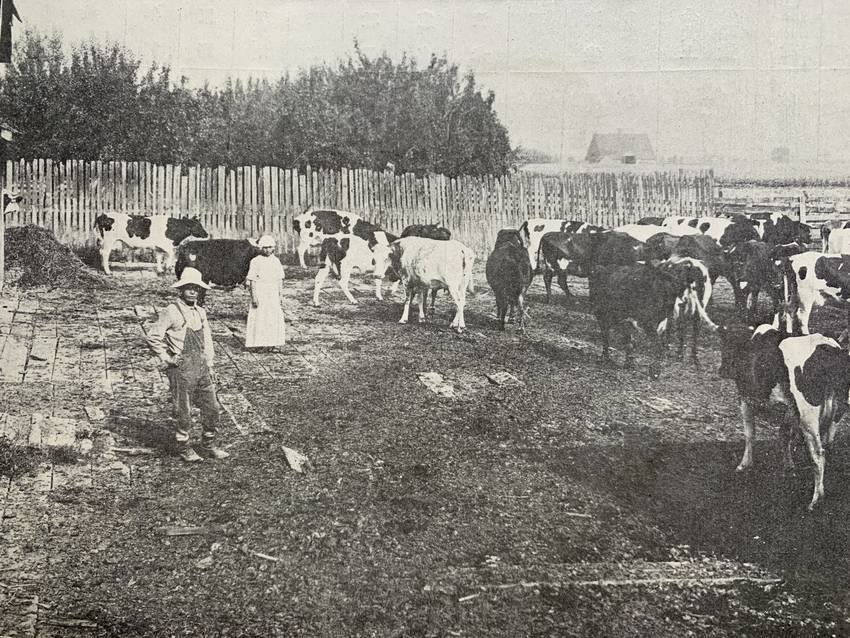Blog Thread
- JAPANESE DAIRY FARMERS IN WASHINGTON STATE
 Grandpa & Grandma Tsukamaki
Grandpa & Grandma Tsukamaki
On their dairy farm in Kent, WA, 1920
K Tsukamaki, my maternal grandpa, came to the Seattle area from Hiroshima, Japan, in 1907 and became a dairy hand. He had a Japanese immigrant uncle that was already working as a dairy hand in the Kent valley. In a 1971 interview, Grandpa K was eighty-five years old and told me in Japanese,
“Up until the time of WWI there were close to 100 Japanese dairy farmers and the Nihonjin Rakuno Kumiai (Japanese Dairy Farmers Association) grew to about 150 members. The first president was Gentaro Ikeda, who was the biggest dairy farmer, owning 200 head of milking cows. From this period on discrimination towards Japanese people began to appear more and more. There was a time when the dairy companies would not handle milk produced by Japanese. Mr. Ikeda became the promoter and began a cheese factory which for a time gathered milk from Japanese dairymen. But lacking in management skills, it did not go well. Consequently, it ended up being sold to a Caucasian Association. As an officer of the association, I went through hardships beyond expression.”
“Mr. Fukuhara was then engaged in the business of recruiting people to various jobs. He was hired by the Japanese Dairymen’s Association, about 300 members, to negotiate with the Caucasians. Most of the milk shipped to Seattle at that time were in the hands of the Japanese milk producers. When the White River Creamery (raw milk association) was formed in Seattle, most of the officers were Japanese. Mr. Fukuhara exerted his great effort for the sake of our association. Because the the past president, Mr. Ikeda, of the association went back to Japan, I was elected as his successor. Most of my day during that time was spent in rendering services for the public business. I was then the president of the White River Japanese Association as well as the president of the Japanese Language School.”
During the time I was serving as the president of various organizations, discrimination against Japanese was at the highest and because of that, it was a period of great hardship for all the local Japanese associations. Seattle, in order to plan strategies to tackle discrimination against Japanese, consolidated all the local Japanese associations into one. Although Rengo Nihon kai (United Japanese Association) was formed, deliberations were done on strategies to cope with discrimination and all kinds of measures were introduced for the sake of assimilation to the United States by forming a group called DOKOH-KAI (problem solving group). All efforts in this Americanization and assimilation movement ended without bearing fruits, as shown by the Japanese language newspaper of Seattle splitting into two factions. Money solicited for the cause was of no use.
Contrary to our cause, discrimination towards Japanese became ever stronger and the United States Congress passed a discriminatory land bill directed toward Japanese aliens as well as the Asian Exclusion act in 1924. This brought a final blow to the Japanese farmers. For some, lands were taken away and most Japanese were completely lost, not knowing what to do. For us in the dairy farming business, smaller farms with 30 heads to bigger ones with 200 head, conditions were such that milk cows had to be sold at prices below cost. Most of them went bankrupt. My stomach churns when I think of this period. Even at present I still see the events of that period in my dreams.
Because of such a condition, I sold my cows and started regular vegetable farming under Nisei’s name, Mr. Yoshida. He was a citizen because he had served in the U.S. Army during WWI. But not being familiar with vegetable farming, things did not go as well as I wished. When a person starts to go downhill, nothings goes well. In December 1926, my wife was stricken with an acute pneumonia and died on December 28th. I felt lost and helpless not knowing what to do with four children, five to eight left behind.”
- If you are a bloguru member, please login.
Login
- If you are not a bloguru member, you may request a free account here:
Request Account